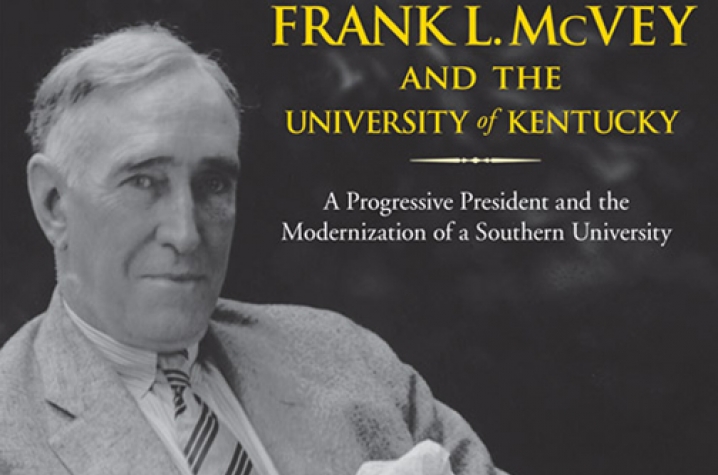A Presidential Visionary
LEXINGTON, Ky. (Feb. 17, 2011) − Much has been written about the University of Kentucky's goal to become a top-20 research institution by 2020 and the Top 20 Business Plan. Few people, however, know of the earlier push to raise the university’s research standards, diversify the curriculum, and modernize faculty and staff procedures.
Frank L. McVey, UK's third president, served as the visionary responsible for establishing academic professionalism as the top priority for the future of the university. The university has McVey to thank for laying the foundation for growth and instilling a passion for research that has been fundamental to its current efforts.
UK will celebrate the work of this institutional forefather at an upcoming reception and book launch for Eric A. Moyen's McVey biography, "Frank L. McVey and the University of Kentucky: A Progressive President and the Modernization of a Southern University," published by University Press of Kentucky (UPK). The event presented by President Lee T. Todd Jr., UPK, UK College of Education and UK Special Collections Division is scheduled for 2:30 p.m. Monday, Feb. 21, at the Lexmark Room in the Main Building. The new biography will be available for purchase at the reception.
"President McVey was historically responsible for much of the foundation of the academic environment and research enterprise at UK, and provided a model for quality education in the South," notes President Todd. "We are thrilled new generations of UK faculty, staff and students will be able to learn more about this important university figure through Eric Moyen’s biography."
"Frank L. McVey and the University of Kentucky" is the newest publication in UPK's Thomas D. Clark Studies in Education, Public Policy and Social Change Series edited by Richard Angelo, associate professor of education policy studies and evaluation. The UPK series is made possible with support from UK College of Education.
In "Frank L. McVey and the University of Kentucky," Moyen explores not only McVey’s presidency from 1909 to 1940, but also the challenges that faced a state institution during an era of dramatic social change. President McVey understood the essential role the university plays in the lives of the citizens of the Commonwealth by providing interpretations of social movements, conducting scientific investigations, and exemplifying how higher education can benefit society as a whole. He did not shy away from the university’s inadequacies, but instead faced them head on. McVey constantly focused on academic improvement, eschewing the false sense of excellence that many of his contemporaries at other universities presented.
Guiding the university through World War I and the Great Depression, McVey did more than keep the school afloat. By the end of the war, he had reduced professors’ course loads and raised their salaries, hired a dean of men, and implemented a “modern” constitution to involve faculty members in the university’s policymaking. During this time, the university also created a committee on discipline, allowing faculty to focus less on punishing students and more on teaching them. The most dramatic change McVey made was a demand for academic quality from students. Under his leadership, the university began requiring students to earn a certain number of high marks within their majors in order to graduate.
The most noticeable impact of the McVey presidency on the UK campus was the expansion of campus and the construction of new facilities. Still visible and in use today, Alumni Gymnasium, Memorial Hall, Margaret I. King Library and Jewell Hall were all developed under the president's guidance. McVey’s leadership also resulted in an expansion of academic offerings at the university. Because of him, the College of Arts and Sciences welcomed the departments of music (now part of the College of Fine Arts), anthropology and archaeology, and library science (now part of the College of Communications and Information Studies). In addition, the College of Commerce (now the Carol Martin Gatton College of Business and Economics) and the College of Education were established by McVey’s administration.
"Frank L. McVey and the University of Kentucky" not only chronicles one of the most dynamic times in the university’s history, but also places UK within the greater trends in higher education. McVey’s reorganization of the university gained him recognition as one of the most progressive educators in the South and placed Kentucky at the forefront of academic expansion. Decades later, the university continues to follow his direction, setting ambitious research goals and making contributions to the overall betterment of Kentucky.
"In a judicious assessment of Frank L. McVey, a major figure in the higher education of the U.S. South, Eric A. Moyen has produced one of the best biographies of a modern American university president," said William Link, author of "William Friday: Power, Purpose, and American Higher Education" on the former University of North Carolina president. "Through lucid, accessible prose combined with meticulous research, Moyen succeeds in showing how McVey constructed the modern University of Kentucky."
Educator and biographer Eric A. Moyen serves as an associate professor of education at the Helen DeVos College of Education and director of first-year programs at Lee University. He completed his doctoral degree in educational policy studies and evaluation at UK, and holds a bachelor's degree from Taylor University and a master's degree from University of Alabama. Before joining the faculty at Lee University, Moyen served as a research assistant, teaching assistant and oral history interviewer at UK.
Offices for the administrative, editorial, production and marketing departments of UPK are found at UK, which provides financial support toward the operating expenses of the publishing operation.
For more information on this book or for purchase information, visit UPK online at www.kentuckypress.com/.
MEDIA CONTACT: Whitney Hale, (859) 257-1754 ext. 229; whitney.hale@uky.edu






